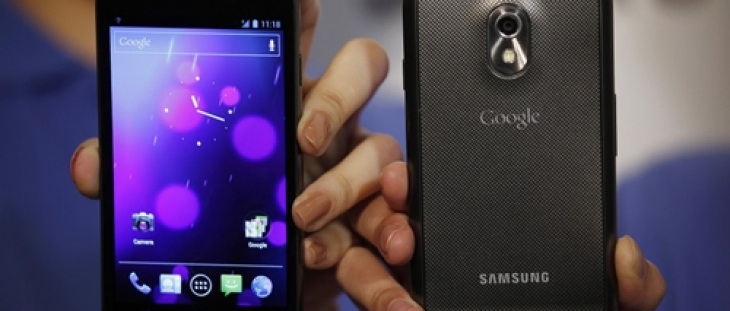
When you stop to think about it, it’s actually a very strange phenomenon: we now spend an inordinate amount of time thinking and caring about whether or not our phones are sexy. Think about that. Sexy. It’s always been a word that has belied the ripples of desire beneath our fetish for consumer goods, our obsession with the thin, the shiny, the new.
So toying with the Samsung Galaxy Nexus and its pure Google Android 4.0 interface, I have to ask myself: do I care whether or not it’s beautiful? What exactly am I looking for to agree or disagree with the assertion that, with this phone, Android finally has a soul?
It’s clear looking at the Galaxy Nexus that a great deal of thought has gone into both the hardware and the “insides” of the interface–arguably, though, a lot more attention has been paid to the latter. The shell retains the slightly convex shape of its predecessor, while its hard plastic is utilitarian, if uninspiring. It’s also huge, yet the bright, impressively sharp 4.65 screen inch manages to somehow remain not too huge. But so far, no sign any of soul.
It’s the newest version of Android, nicknamed Ice Cream Sandwich, that is the obvious story here. And on first glance, it certainly is impressive. After unlocking the phone with your face (an actual feature, not a modern playground taunt) you are greeted by what is by far the cleanest, most aesthetically pleasing version of Android yet.
Does that new coat of paint matter? Arguably, yes. As the late Steve Jobs always said, aesthetics aren’t just about how something looks. It’s about how something feels to use. And today there is something of a debate over the type of aesthetics that our preferable: between the type of person who uses an iPhone because it conforms to a particular ideal of where aesthetics fits into life; and the person who uses an Android phone because it’s just so damn practical.
As I noted when I reviewed an Android tablet, Google excels at software design when it focuses on a tight, almost seamless integration with the company’s own services. Being able to only get alerts for messages in your Priority Inbox actually makes emails notifications useful again, instead of a relentless beeping bane. It really works well.
But on the Galaxy Nexus, some new aesthetic and interface flourishes seem to take the question of “what a thing feels like” seriously. Notifications can now be dismissed with a satisfying swipe and applications can be closed the same way. The OS’ new font, Roboto, is a significant step up. The annoying obtuse menu button is gone, replaced by a very Windows Phone 7 approach that has you flick up options at the bottom of the screen.
It all seems to make a heck of a lot more sense. Helping matters is that the phone’s dual-core processor is blazingly fast. Alas, not even it can prevent the hiccups and pauses that are, it turns out, part of the operating system itself.
But like the iPad or Kinect, the Samsung Galaxy Nexus is also one of those gadgets that just feels “neat,” in large part because it always seems like it’s about to do something that you haven’t seen before. Android now feels right. It is cohesive and intuitive in a way that up until now, it never has been. But it must be said that it doesn’t quite match the smoothness of iOS or the sheer aesthetic pleasure of Windows Phone 7.
But it feels like it was something put together by people who cared about the end user’s experience. And taken as a whole, the “beauty” of the phone is that the changes and new features, rather than being only superficial, make doing what you want easier. Being able to pinch-to-zoom in the calendar, quickly navigate your email or easily and efficiently use Twitter or Facebook isn’t necessarily sexy–but then, who wants it to be?
In literary studies, it is often said that the difference between prose and poetry is that the latter deliberately makes you pay attention to language: that it purposefully makes you look at the interface of meaning. Tech, though, isn’t supposed to be poetry; it isn’t supposed to make itself known. It’s supposed to get out of the way and let you perform your day-to-day tasks as easily and transparently possible. It should be prose. And in never being sexy, but rather, beautiful in its practicality, Android and the Samsung Galaxy Nexus succeed in that goal admirably.
Navneet Alang is Toronto Standard’s tech critic. You can follow him on Twitter @navalang.
Subscribe to our newsletter.











